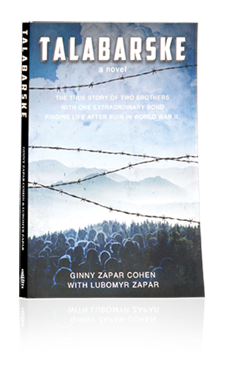OFF THE SHELF

Cynthia D. Bertelsen (M.S. human nutrition and foods '78), "Mushroom: A Global History," history, food, Reaktion Books.
Roderic Brame (Ph.D. geology '03) and Rachel Brame, "Mighty Titans," educational, biography, R2B2 Publishing.
Chekitan S. Dev (hospitality and tourism management '88), "Hospitality Branding," marketing, Cornell University Press.
James T. Maughan (M.S. biology '74), "Environmental Impact Analysis: Process and Methods," reference, CRC Press/Taylor & Francis Group.
Patrick J. O'Connor (Ed.D. vocational-technical education '82), "Meet Me at Ray's: A Celebration of Ray's Place in Kent, Ohio," history, restaurant/tavern, Black Squirrel Books/Kent State University Press.
Frances Park (psychology '77) and Ginger Park, "Allergies Away! Creative Eats and Mouthwatering Treats for Kids Allergic to Nuts, Dairy & Eggs," cookbook, St. Martin's Press/Thomas Dunne.
Sally Phillips (marketing management '84), "50 Revelations from the Heart: 50 Lessons on Living and Loving Fully," self-help, self-published.
Janice Saunders (Ph.D. sociology '81), "Old and Cold: Orientation 101," humor, aging, Hamilton Books.
Rosemary Tran Lauer and Scott Beller (communication '91), "Beggars or Angels: How a Single Mother Triumphed Over War, Welfare and Cancer to Become a Successful Philanthropist," memoir, Oaklight Publishing.
Frank Miller (psychology '72), "Newtown's Trees," novel, allegory, tragedy, Tate Publishing/Children's Division.

Ginny Zapar Cohen (hospitality and tourism management '96) is a blogger, entrepreneur, freelance graphic designer, mother, and chronic overachiever fueled by life, family losses, and her coffee addiction. An activist for children with disabilities, Cohen co-directs Surfers Healing Virginia Beach, which takes kids with autism surfing, and is a runner for Team Hoyt VB, which pushes children with disabilities in road races.
In her debut novel, "Talabarske," a historical fiction about World War II she wrote with her father, Lubomyr Zapar (business administration '62), she strives to capture her family's escape from communism to find their own American dream. Below is an excerpt from the book, reprinted with Cohen's permission.
It was white as far as the eye could see. The five wives and their children sat in the tattered covered wagons, held hostage by their own fear and silence. They had already waited nearly two hours—the snowdrifts rose to the top of the wagon wheels. The horses were restless, shifting from side to side in anxious anticipation of their continuing journey westward. But nothing moved. The air had that steely smell of snowfall and even through the bitter cold the wives felt nothing but crushing fear. Time stood still.
They could see dim candlelight coming from inside the cabin and a small plume of smoke rising from the chimney. The caravan sat idle in front of the makeshift border patrol about a quarter of a mile away—just far enough for the ladies to be able to remain fixated on the movements inside, yet too far to hear or see anything that was going on within the stone walls.
One hour in, they could take it no more. They decided to trudge through the drifts, children on their hips, and beg the guard to let their husbands go.
Cautiously, Daria opened the door to find her beloved husband, Iwan, and his brother, Petro, lined up against the back wall with three other husbands from their caravan. It was an ominous sight—perhaps the prelude to their execution. Daria couldn't help but remember Iwan's final plea before they had chosen this risky path for their young family: One way or another they would all die or survive together—but they would not give up. They would do everything in their power to claim this life that was theirs.
They belonged to no one.
Produced by University Relations